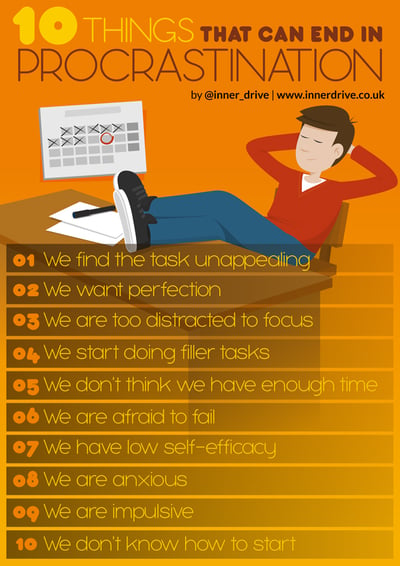Every student procrastinates at some stage in their academic career, but when it becomes the norm - as it is for 50% of students – it can have a detrimental impact. This is because procrastination can not only negatively impact your physical and mental health but is associated with low academic achievement, declining grades, and low self-efficacy.
In part one of this two-part series, we delved into five different types of procrastination and how to deal with them better. However, as researchers have failed to agree upon what causes procrastination, we’re exploring five more reasons for procrastination in this second part.
 Why do we procrastinate?
Why do we procrastinate?
Fear of failure
Students often find themselves procrastinating because they’re afraid of failing or not achieving the grade they want to achieve. This can lead to procrastination in a variety of ways as students may avoid starting or finishing the task.
For example, a student may have an oral French exam next week but put off practising because they feel they won’t do well regardless of how much they prepare for it. However, the amount of fear the student feels will depend on how important the oral exam is to their grade. Typically, tasks that hold more weight are associated with higher levels of fear - and consequently, procrastination.
On the other hand, research suggests that a fear of failure can actually act as a motivator to do the task on time and avoid procrastination. However, this only happens when they feel they are capable and prepared to complete the task.
Low self-efficacy
Self-efficacy refers to the confidence a person feels about their ability to perform a task well. Researchers have shown that people who tend to self-doubt and view themselves negatively are more likely to avoid tasks and new opportunities. This is because they avoid tasks that make them feel less confident about their abilities.
For example, a sixth-form student with low self-efficacy may not apply to top universities because they feel they won’t meet the entry requirements, despite their predicted grades suggesting otherwise. Consequently, they may miss out on opportunities that push their intellectual development.
It’s interesting to know that self-efficacy can be domain-specific. To illustrate, a student may have high levels of social self-efficacy but low levels of academic self-efficacy. This means that they are confident with carrying out social tasks but are less so when it comes to completing academic assignments - which eventually leads to procrastination.
Anxiety
Task avoidance is quite common amongst people who tend to be anxious in stressful situations. Although they understand that putting off the task won’t make it go away, they still use procrastination as a coping mechanism for stress.
To diminish their stress-related symptoms, people sometimes engage in ‘Present Bias’ by shifting their focus to more immediately rewarding tasks rather than focusing on future tasks that may be more important. This form of procrastination is done as an attempt to alleviate the stress they feel.
Long-term, this can be particularly problematic as it can cause people to develop what is known as a ‘feedback loop’. This is when feeling anxious about doing well on a task causes people to avoid completing the task as they can “worry about it later”. However, by avoiding the task the person’s anxiety levels increase as the deadline is now closer, leading them to procrastinate even further.
Impulsiveness
Procrastination and impulsiveness are strongly linked to each other.
Research has shown that impulsivity is one of the strongest causes of procrastination. The problem isn’t that you don’t know how to start a task: it’s that you start too many tasks. People who consider themselves impulsive struggle with self-regulation and setting boundaries.
Being impulsive essentially means that you act on your impulses as soon as you get them. For example, if you have the urge to tidy your room then you’ll immediately act on that urge when you could just wait until you’re done with your work. As a result, you’ll push the task you need to do to the side and your homework session will be less productive.
One way to avoid the potential for impulsive behaviour is to get rid of any potential distractions in your workspace and to set yourself hard deadlines. Block certain websites like YouTube so you don’t fall into the wormhole of cooking shows and dog videos.
Not knowing how to start
We’ve all found ourselves staring at a blank work document, not knowing what to say or not feeling confident with the direction we wanted to go in. As a result of this uncertainty, we didn’t take that necessary first step.
When trying to complete an important assignment, we tend to overthink every little thing we say or do in an effort to meet the standards we set ourselves. You may have written the introduction to that 3000-word essay due in 3 days but underestimated how much time and effort is needed to complete the whole task. This causes stress so we procrastinate.
This is why when doing a complex task, it is important to break it down into smaller chunks and do one thing at a time. Finished writing the introduction? Only focus on writing the next paragraph for your essay next. This will make the task a lot more manageable, reducing the likelihood of procrastination.
Final Thoughts
Procrastination is a lot more common than people think. 75% of students consider themselves procrastinators. Due to the negative impact it can have on overall well-being as well as grades, it is important to know what your triggers are.
Procrastination is a very complex topic as people procrastinate for a variety of different reasons. So much so, that even researchers can’t agree on one or two fundamental causes. In the end, why we procrastinate is a combination of personal traits and the environment we work in. Once you recognise that your procrastination is problematic, you can take the necessary steps to change your behaviour and form new habits.
Don't forget to read part 1 of this series if you haven't yet. For more tips, advice and strategies on how to help students avoid distracting temptations, check out our blogs on Minimising Procrastination.







